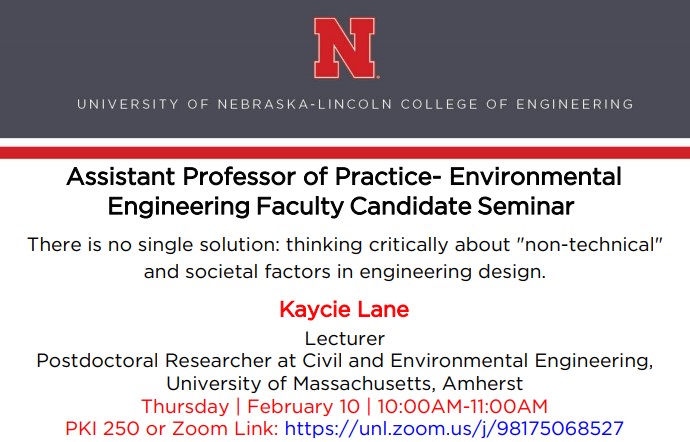
Assistant Professor of Practice- Environmental
Engineering Faculty Candidate Seminar
There is no single solution: thinking critically about "non-technical" and societal factors in engineering design.
Presented by Kaycie Lane, Lecturer; Postdoctoral Researcher at Civil and Environmental Engineering, University of Massachusetts, Amherst
Thursday | February 10 | 10:00AM-11:00AM
PKI 250 or Zoom Link: https://unl.zoom.us/j/98175068527
Abstract: In engineering education, a traditional approach to teaching design equations has been to teach theory,
apply the theory to equations and problem sets and guide students to the "correct solution". The principles that
underlie this method are in practice for a critical reason: if engineers calculate a value incorrectly, it can have a
massive impact on our infrastructure and environment. However, in practice, coming up the "one correct solution"
can blind engineers to the multitude of non-technical factors that influence our design decisions. Engineering design
in practice involves the consideration of who the design is for, how much the design costs, unintended consequences
of designs, long-term sustainability and reliability and the appropriateness of long-term solutions. It is important to
maintain the integrity of design principles; I posit we can approach design problems in engineering education to
better teach young engineers how to integrate “non-technical” elements and still achieve a viable solution.
In this seminar, I will present some of my own experiences working as both a researcher and engineer in small
drinking water systems and how working with vulnerable populations has impacted my teaching philosophy. My
experiences have taught me that cultural appropriateness and long-term sustainability are not just checkboxes to be
ticked to fulfill design criteria; these factors must be integrated into engineering design from day one. I will present
how I use my knowledge of small systems to adapt engineering problem sets, design final group projects and
promote application-based learning in the effort to teach young engineers the importance of a wider perspective and
critical thinking when we design engineered solutions.
Bio: Kaycie Lane is a small drinking water systems engineer and risk management researcher currently working at the
University of Massachusetts Amherst. She obtained her Ph.D. from Dalhousie University in 2020 and her Bachelor's of
Science in Engineering Physics from Colorado School of Mines in 2014. During her undergraduate degree, Kaycie
minored in Humanitarian Engineering and worked on sustainable community development projects in rural
communities. In her PhD, she continued to work with underserved communities in Atlantic Canada, working with small municipal, Indigenous and Arctic communities, examining how risk assessment approaches can best be integrated into
drinking water management strategies. Her current work continues to focus on small drinking water systems solutions,
particularly on appropriate technological solutions for rural communities facing specific contaminants of concern.
When teaching, she focuses on how "non-technical" factors influence design decisions in the engineering world, aiming
to stress the importance of meaningful community engagement, integration of multiple stakeholder perspectives and the consideration of how engineering designs have lasting societal impacts. When not teaching or researching, Kaycie
teaches group fitness classes, hikes and mountain bikes with her family and occasionally finds time to read a good
book.
More details at: https://unl./zoom.us/j/98175068527